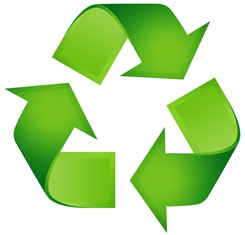SU Recycling Tops 50 Percent for First Time
 SALISBURY, MD---When 91短视频’s recycling program began in 1990, few could have predicted how much it would grow.
SALISBURY, MD---When 91短视频’s recycling program began in 1990, few could have predicted how much it would grow.
Some 23 years ago, tin and aluminum cans from the campus’ dining hall were set aside from the rest of the University’s waste and transported to recycling centers instead of landfills. Today, SU recycles everything from computers to cooking grease.
Recently, the University marked a milestone in its recycling program. Last year was the first that more than 50 percent of the campus’ waste was sent to recycling outlets, up from just 27 percent in 2011. In all, nearly 740 tons of glass, wood, metal, paper, food waste, electronics, appliances, batteries, tires, grease, carpet, fluorescent light tubes and even yard waste were diverted from landfills.
Kevin Mann, SU physical plant director, credits much of the increase to a partnership with Delaware-based Blue Hen Organics that began last February. Through that program, food waste is collected at nine University Dining Service outlets in the Commons and Guerrieri University Center, including food preparation, dining and dish cleaning areas.
It is then sent to Blue Hen’s facilities, where it is composted and compressed into a soil enhancement product and sold to area farmers for large-scale use. SU’s Horticulture Department also purchases the product at a reduced rate, allowing it to lessen its dependence on synthetic chemical fertilizers, Mann said.
In 2011, before the partnership began, none of SU’s food waste was recycled. Now, 100 percent of it is, accounting for some 304 tons in 2012. This ranges from half-eaten food and chicken bones to fruit peels and even paper goods like napkins and plates.
Mann is quick to point out that while the University could not have reached its current recycling rate without the Blue Hen partnership, recycling in other areas also increased from 2011 to 2012.
Significant increases include glass and aluminum items, which Mann credited to the SU Student Government Association’s aggressive Recycle Madness campaign. During Recycle Madness, students and campus organizations are challenged to see who can collect the most recyclables. Winners receive prizes.
Cardboard recycling also grew thanks to two new collection points at the Sea Gull Square residence-retail complex and SU’s central recycling area, where the program is based. Collection of recyclable yard waste for recycling also was up in 2012, due in large part to debris remaining in the wake of Hurricane Sandy in October, Mann said.
To handle the overall increase in recyclables, SU worked with Dove Pointe, a local service and educational center for individuals with disabilities, to hire additional employees to help sort materials. Workers from Dove Pointe also operate the Commons’ tray return and dishwashing area, and transport all bins to the building’s main compost receptacle. Mann said this, too, helped SU reach its current recycling numbers.
He wants more, however.
“We are pushing our market, trying to go single stream,” he said, noting that “single stream” would lead not to garbage dumps, but instead to recycling centers. “We are hoping that soon, SU will have nothing going to the landfill.”
Right now, according to Mann, the only thing standing in the way of that dream is finding an area waste vendor with zero-landfill capability, which would be able to recycle 100 percent of SU’s output. He is optimistic, however, that the University eventually will reach that goal.
In the meantime, he hopes to see SU’s percentage of recycled materials grow in 2013. The campus has a reputation to keep. The Princeton Review, in partnership with the U.S. Green Building Council, has recognized it among the nation’s most environmentally responsible colleges annually since 2010 — a distinction Mann and others hope to maintain.
For more information call 410-543-6030 or visit the SU Web site at www.salisbury.edu.
